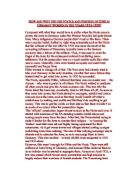Why did Status and Position of Jews Worsen in Years 1933-39 and in Occupied Europe 1939-45?
In 1933, Hitler was the head of the Nazi party. He was anti-Semitic, and his aims and ideology were to remove Jews from German society as a part of purifying Germany. He became the Chancellor of Germany in 1933, but he did not have full power over Germany, as Hindenburg was still alive. With the death of Hindenburg, Hitler was now the leader of Germany. He had achieved power in Germany and now he was able to implement his ideas to German people. He started off with increasing the level of Anti-Semitism in Germany. He made people boycott Jewish shops, but gradually the Anti-Semitism worsened and the Nazis passed laws to try to isolate Jews in German society. The Nuremburg Laws in 1935 was the peak of Anti-Semitism in Germany in this period. Some of the laws said that Jews were no longer to be German citizens, Jews cannot marry non-Jews, and that Jews cannot have sexual relations with non-Jews. The reason why Hitler made these laws was that he was trying to make life so unbearable for Jews that eventually they would just give in and emigrate from Germany. Here now what Nazis were doing was legal, as they now had the laws behind them to carry on Anti-Semitism, and they had more things to prosecute Jews against doing. Anti-Semitism was not increasing in 1936, because of the Berlin Olympics. Germany wanted to show what a great nation it was, and with the majority of the world focusing on Berlin, Anti-Semitism was not continued for everyone to see, they wanted to keep this secret. In July 1938, 32 countries met in France for the Evian Conference. This conference was where all of the countries met to discuss Jewish emigration. No country was prepared to increase their Jewish quota. This gave Hitler an excuse, and showed him that all of the other countries were as Anti-Semitic as Germany was. He had given the other countries a chance to take the Jews away from him, but now that they weren’t prepared to do this, Hitler could be as Anti-Semitic as he wanted, and in the end if other countries protested, then he could say that they had the chance to save them from this, but they opted not to. By this time, Germany had staged the 1936 Olympics, annexed Austria and part of Czechoslovakia, and was in the middle of a strong economic recovery, with a rearmament process happening as well. These triumphs had increased the Nazis' popularity and their confidence. On the night of 9-10 November 1938, Josef Goebbels, the Nazi propaganda minister organised a violent outburst known as ‘Kristallnacht’ (The night of the broken glass). Whilst the police just stood and watched, Nazis burned down synagogues, and broke into Jewish homes throughout Germany and Austria, terrorising and beating men, women and children. Ninety-one Jews were murdered and over 20,000 men were arrested and taken to concentration camps. Afterwards, the Jewish community was fined one billion Reichsmarks to pay for the damage. After Kristallnacht, Jewish businesses were expropriated, private employers were urged to sack Jewish employees, and offices were set up to speed emigration. Imprisoned Jews could buy freedom if they promised to leave the country, abandoning their assets.







